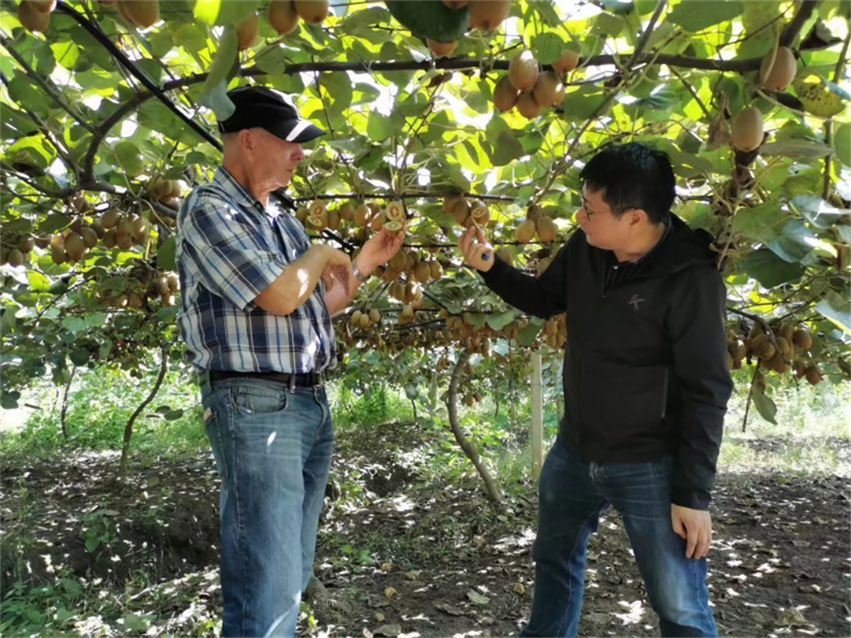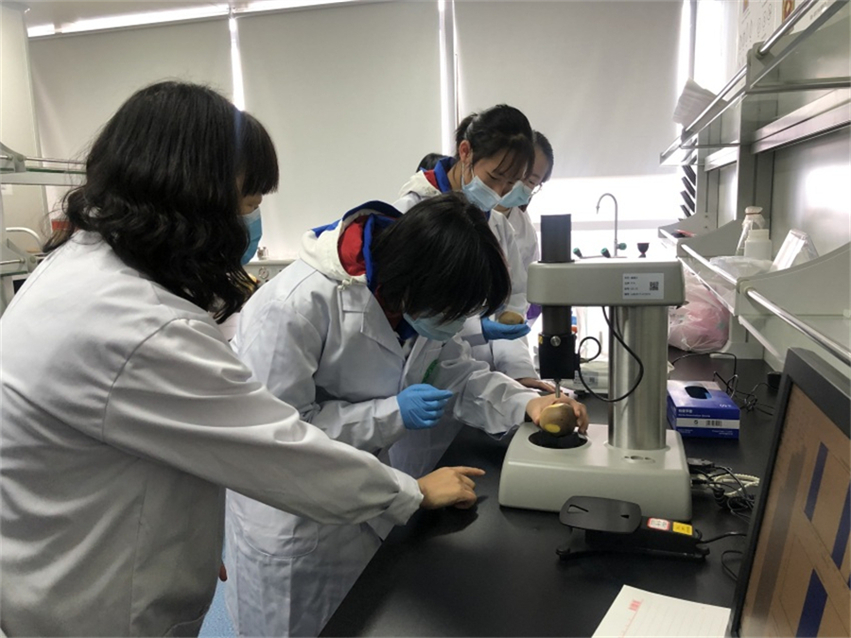China strengthens cooperation on kiwifruit cultivation with foreign countries under BRI
Golden kiwifruits hanging by the branches presented a scene of a bountiful harvest at a kiwifruit sci-tech research base of the Sichuan Provincial Academy of Natural Resources Science in Shifang city, southwest China's Sichuan Province on Aug. 16.
Inside a laboratory, researchers were conducting tests on a new variety of kiwifruit, measuring their weight, size, color, and sugar acidity.
"On Nov. 21, 2014, President Xi Jinping and then-New Zealand Prime Minister John Key jointly unveiled the laboratory project. In September 2020, the laboratory was included in the list of Belt and Road joint laboratories by the Ministry of Science and Technology," said Li Mingzhang, a senior researcher at the Sichuan Provincial Academy of Natural Resources Science, and the former director of the lab.
Li said that the establishment of the joint lab not only contributes to the preservation, evaluation, and development of kiwifruit germplasm resources but also contributes to the development of industries in countries participating in the Belt and Road Initiative (BRI) through the introduction of kiwifruit cultivation technologies.
According to Zhuang Qiguo, the Chinese director of the joint lab, the kiwifruit innovation team at the Sichuan Provincial Academy of Natural Resources Science has independently cultivated the Sichuan kiwi series and the world's first commercially viable red-fleshed kiwifruit variety called "Hongyang" after 15 years of efforts.
This has allowed kiwifruit, once considered a wild fruit, to successfully go out of the mountains and enter people's dining tables.
"Currently, the new varieties we developed have obtained variety protection rights in 14 countries and the European Union, and have been authorized for cultivation on more than 3,500 hectares of farmland in countries such as Italy and Chile. In the past three years, we have exported a total of 240.2 tonnes of independently cultivated new varieties, with sales amounting to 5.37 million yuan ($735,000)," said Li.

Li Mingzhang (right), works with Russell Lowe, a breeding scientist at Plant and Food Research, New Zealand, at the research base. [Photo courtesy of the interviewee]
In addition to accelerating the industrialization and promotion of achievements, China and New Zealand have also jointly promoted kiwifruit industry chain innovation through the complementary integration of germplasm resources, industrial technology, markets, talent, and geographical locations.
The joint lab has promoted the transformation and application of more than 30 sci-tech achievements. The independently cultivated varieties have been widely planted in over 15 provinces and cities across China, accounting for 30 percent of the total kiwifruit planting area nationwide and over 70 percent in Sichuan.
The increasing demand for high-quality kiwifruits has brought substantial income to farmers and also driven sci-tech innovation and research and development (R&D).
The new varieties independently cultivated by the innovation team at the Sichuan Provincial Academy of Natural Resources Science have become the main varieties grown in kiwifruit production areas such as Shaanxi, Sichuan, and Guizhou provinces, and have been promoted to countries participating in the construction of the BRI.
The products have been exported to high-end fruit markets in Europe and the U.S., marking a significant leap for domestically produced kiwifruit from catching up to leading the industry.
In recent years, the Sichuan Provincial Academy of Natural Resources Science has also shared modern kiwifruit management techniques with scientists from countries such as Thailand, Afghanistan, Pakistan, and Nepal, helping the technological achievements go global and driving the development of kiwifruit industries in these countries.

A teacher guides students on experiments at the joint lab. [Photo provided by the Sichuan Provincial Academy of Natural Resources Science.]
Li mentioned that the lab has enhanced the safeguarding of intellectual property rights for kiwifruit varieties overseas and established new trial bases in several countries, including Italy, France, Spain, Portugal, South Africa, the U.S., and Australia. These efforts have facilitated the introduction of premium Chinese kiwifruit varieties into the global high-end market.
"Our technology has been introduced to countries such as Nepal, Afghanistan, and Pakistan. We have not only promoted new varieties but also provided support in technical training. In October, we will organize training and talent exchanges for researchers from more than 10 countries participating in the joint construction of the BRI in Chengdu," said Zou Ruoli, Party chief of the Sichuan Provincial Academy of Natural Resources Science.
























